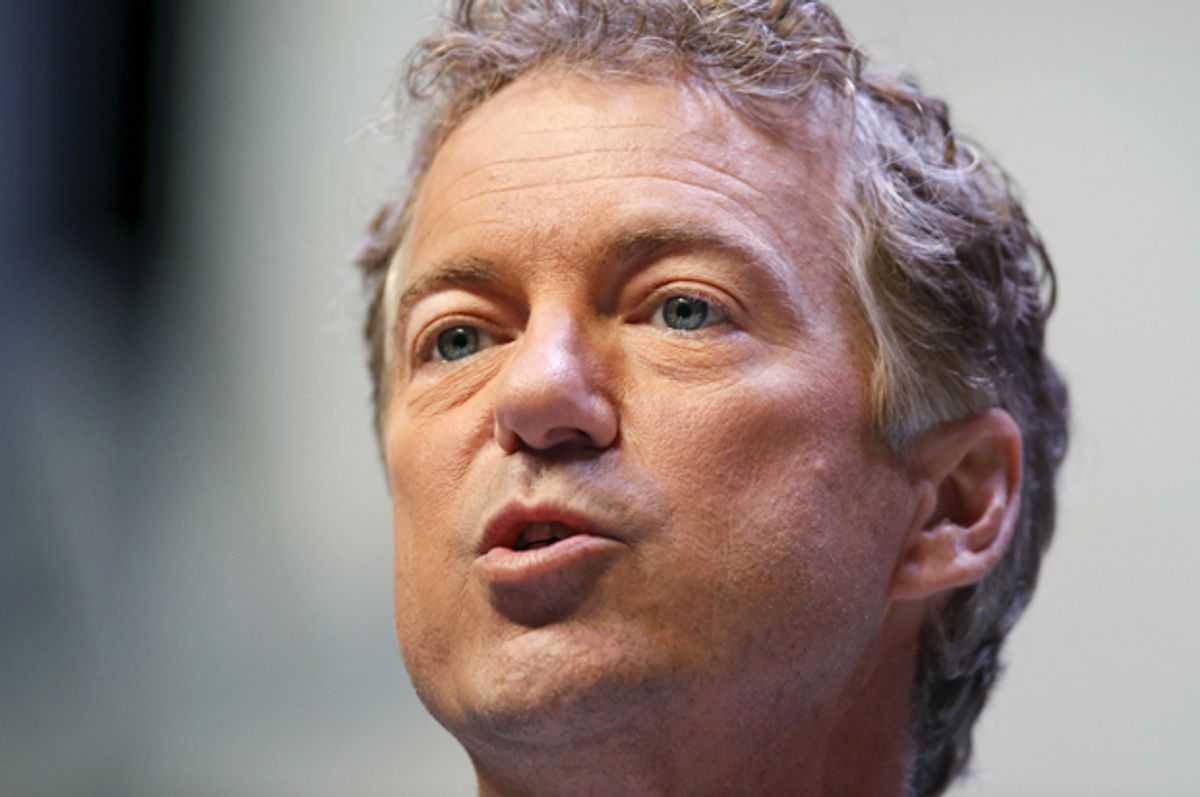If there’s one thing Donald Trump does well as a candidate, it’s antagonize Rand Paul. Trump has spent months mocking the Kentucky senator for his poor showing in 2016 polls, questioning whether he should be considered a serious candidate, and generally characterizing him as a weak and ineffectual antithesis to his own brand of brash and obnoxious campaigning. Following Rick Perry’s and Scott Walker’s departures from the 2016 race, and reacting to the latest Quinnipiac polling, Trump instructed an intern to tweet for him that Rand would be the next candidate to drop out.
[embedtweet id=648875968275304448]
As far as political predictions go, this isn’t the worst one ever made.
The Rand Paul 2016 campaign death watch is in full swing after the candidate spent the entire summer collapsing in national and state-level polling. Nationwide he’s polling at a meager 2.7 percent, having fallen from a mid-May high of 9 percent. In New Hampshire, the state he said was a must-win this past April, Paul is pulling in just under 4 percent, down from 14 percent in January. When he appears on TV or gives interviews, Rand is fending off questions about how much longer he’ll stay in the race. He’s gone from a top-tier candidate to a presumed also-ran in just a few months, and he got there by stomping all over his own image as “the most interesting man in politics.”
The big selling point for Paul 2016 is that he is a “different kind of Republican.” He hewed close to party orthodoxy on most issues, but he held more libertarian views on foreign policy and criminal justice. This allegedly made him a sort of multi-threat politician who could turn out the committed libertarian followers who powered his father’s presidential campaigns, appeal to hardcore conservatives with his economic policies, and also siphon off traditionally Democratic voters. That promise of crossover appeal briefly gave him a reputation as the most formidable of the Republican candidates and the biggest threat to the Democrats’ hopes of keeping the Obama coalition together for 2016. “It’s kind of dangerous to have a Republican like Rand,” a Paul aide boasted to the Daily Beast last August.
But Team Rand appeared to have miscalculated badly. As national security issues dominated the headlines and occupied much of the Republican-controlled Congress’ attention, Rand found himself isolated in a party that was rediscovering its love for hawkish foreign policy. And so he began inching further and further rightward, proposing steep increases to the defense budget (the same budget he had once lectured Republicans was “not sustainable”) and joining the rest of the party in calling for a more aggressive military response to the Islamic State. He alienated libertarians by signing on to Sen. Tom Cotton’s provocative “open letter” to Iran, which was viewed as a deliberate effort to sabotage the ongoing nuclear negotiations. Rand was “a different kind of Republican” who sounded more and more like a normal Republican.
As the summer rolled along, the Paul campaign kept sinking and kept trying to find new ways to get Rand back into the national conversation. They tried gimmicks – the campaign produced a video in which Rand, wearing a “Detroit Republican” T-shirt, destroyed a printed-out copy of the tax code with a chainsaw. They tried positioning Rand as the anti-Trump – Rand was the first candidate to attack Trump at the first debate, and he gave a series of interviews criticizing Trump as a fake conservative who was merely posing as a Republican. Neither strategy worked, so campaign staffers began telling reporters that their real strategy was actually to lay low and stay out of the spotlight for the time being.
While Rand was trying and failing to reignite interest in his candidacy, his campaign apparatus started fraying. Reports of staff infighting and fundraising trouble have been popping up in the media. The scandal-plagued aides he’d picked to run one of his super PACs were indicted in connection to a political payola scheme. And news broke just yesterday that another pro-Rand super PAC has stopped raising money out of frustration over Paul’s poorly run campaign and abandonment of the libertarian positions that once defined him. Rand’s inability to rally the party’s libertarian members to his side has been a recurring theme of the campaign – Ted Cruz just very publicly rolled out a slate of endorsements from former Ron Paul supporters who are now on Team Cruz.
There’s also the question of Rand Paul’s Senate seat. Paul has gone to great lengths to make sure that he could get around Kentucky state law and run for president and for reelection to the Senate at the same time. That has fed the perception that Rand himself either isn’t entirely committed to the presidential race or isn’t confident in his chances and is keeping the Senate option open as Plan B. It’s difficult to convince voters that you’re fully committed to the presidential race when you’re crashing in the polls and taking time off the trail to raise money for your fallback option.
But who knows … maybe every outward indicator is wrong. Perhaps Rand Paul is just lulling the opposition into a false sense of security before unexpectedly springing back into contention – the rope-a-dope strategy his campaign insisted they were pursuing back in July. Perhaps Rand’s plan to fundamentally change Republican politics always envisioned a prolonged and embarrassing skid in public opinion. If so, one has to give Paul’s campaign credit: They’re doing a bang-up job of masquerading as a fading and chaotic operation with no real chance of success.

Shares